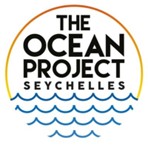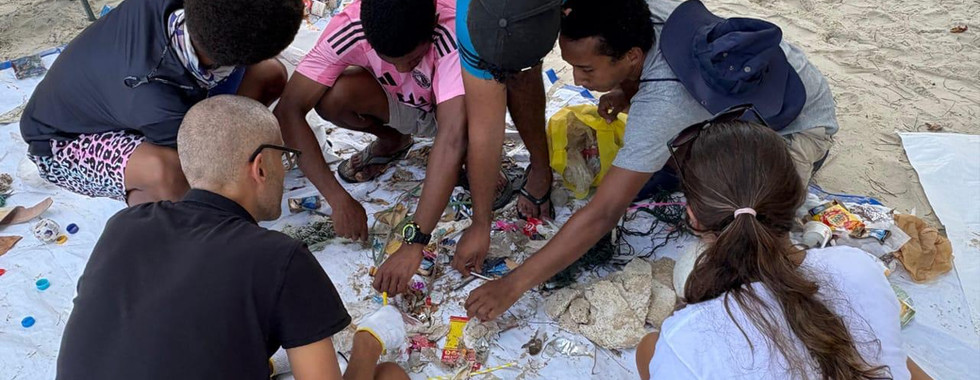The Ocean Project Seychelles Report on Their Commonwealth Clean Oceans Beach Clean-up
- The Ocean Project Seychelles

- Oct 30, 2025
- 3 min read
Updated: Nov 6, 2025
On 21st October, the Seychelles Olympic and Commonwealth Games Association, in collaboration with The Ocean Project Seychelles, the Marine Conservation Society Seychelles, and the Seychelles Defence Forces, organised a beach and underwater clean-up at Beau Vallon on Mahé island. The clean-up was part of the Royal Commonwealth Society’s Commonwealth Clean Oceans Plastics Campaign, which aims to bring together local communities to prevent one million pieces of plastic from entering Commonwealth waterways.
Within one hour, we collected a total of 27.7 kg of litter, comprised of 15.7 kg of plastics (and 2018 individual pieces), 5.5 kg of glass, 3 kg of metal, and 3.5 kg of paper and wood.
The Ocean Project decided to use a specific method for waste collection, which involved collectors recording each individual piece of litter to identify the most common items. These turned out to be cigarette butts (500+), metal bottle caps (350+), and plastic bottle caps (250+). While sorting the litter into the various material categories, we focused on educating community members by clearly distinguishing which types of plastics were recyclable and which were not. Notably, only 2.2 kg of the plastics collected are currently recyclable in Seychelles!
Separating the waste clearly demonstrated how little of our daily rubbish can be repurposed on our small island developing state, leaving the vast majority to persist on our beaches and in our oceans. These activities serve as a platform not only to increase public awareness about the need to reduce our daily plastic use, but also actively encourage the adoption of long-term sustainable waste management methods on a global scale.
As we were cleaning the beach and filming our team of divers, we were lucky enough to capture a whale shark grazing just a few hundred meters offshore Beau Vallon beach. The whale shark migrates through Seychelles during these months and feeds by filtering seawater through its gills, making them particularly vulnerable to the effects of marine plastic pollution. The presence of this flagship species vividly underscores how, without proper action and intervention, our litter can so easily reach and impact the wildlife around us.
Several local organisations supported and participated in the clean-up;
Brikole
IUCN IslandPlas Project
Seychelles Maritime Academy students
Seychelles Police Force
Members of the Public
About The Ocean Project Seychelles:
The Ocean Project Seychelles (TOP) is a non-profit, non-governmental organisation that was established in 2016. TOP has several missions, including mobilising communities to take environmental action, improving public education and awareness about environmental issues, influencing positive behavioural and policy changes, and conducting scientific research. Since its establishment, TOP has actively organised beach clean-ups with the local community on both the inner and outer islands of the Seychelles.
Over recent years, the team has been pivotal in the successful lobbying for the ban on plastic bags, styrofoam food containers (2017), plastic straws (2019) and balloons (2021) in Seychelles. These efforts have certainly brought the country one step closer to a sustainable waste management system. TOP has also implemented the children’s Captain Fanplastic Program in schools, organised screenings of educational films, and installed an immersive plastic art exhibition in the main town of Mahé island. These efforts aimed to improve public understanding, particularly among the youth, of the impact of our global plastic dependency.
At present, TOP is undertaking a Commonwealth Blue Charter-funded project to investigate rivers as sources of marine plastic pollution. This project involves analysing the quantity and composition of microplastics in rivers that run through pristine residential, and agricultural areas, marking novel freshwater research in the country.
ABOUT THE CAMPAIGN
The Royal Commonwealth Society’s Commonwealth Clean Oceans Plastics Campaign will prevent one million pieces of plastic from entering Commonwealth waterways.
The campaign will combine education and local action to encourage people to reduce their plastic waste, highlight alternatives, and reduce pollution across the Commonwealth.
For the action component of the campaign, the Royal Commonwealth Society has partnered with Commonwealth Sport to deliver the Commonwealth Clean Oceans Plastics Campaign as a core component of The King’s Baton Relay. This newly envisioned King’s Baton Relay will focus on sustainability and environmentalism and was launched by His Majesty The King at Buckingham Palace on Commonwealth Day 2025, beginning a 500-day journey to the Commonwealth Games in Glasgow in July 2026.
Journeying through every Commonwealth nation and territory, this partnership will bring together young people, athletes, conservation groups, and the local community for a week of activities, including a plastic clean-up.
The views and opinions expressed are those of the author and do not necessarily represent those of the Royal Commonwealth Society.





































